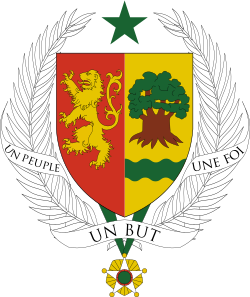21 February 1993 | ||||||||||||||||
| Turnout | 51.46% ( | |||||||||||||||
|---|---|---|---|---|---|---|---|---|---|---|---|---|---|---|---|---|
| ||||||||||||||||
| ||||||||||||||||
 |
|---|
Presidential elections were held in Senegal on 21 February 1993. Incumbent president Abdou Diouf of the Socialist Party defeated seven other candidates, receiving 58% of the vote. Voter turnout was 51%. [1]
21 February 1993 | ||||||||||||||||
| Turnout | 51.46% ( | |||||||||||||||
|---|---|---|---|---|---|---|---|---|---|---|---|---|---|---|---|---|
| ||||||||||||||||
| ||||||||||||||||
 |
|---|
Presidential elections were held in Senegal on 21 February 1993. Incumbent president Abdou Diouf of the Socialist Party defeated seven other candidates, receiving 58% of the vote. Voter turnout was 51%. [1]
| Candidate | Party | Votes | % | |
|---|---|---|---|---|
| Abdou Diouf | Socialist Party | 757,311 | 58.40 | |
| Abdoulaye Wade | Senegalese Democratic Party | 415,295 | 32.03 | |
| Landing Savané | And-Jëf/African Party for Democracy and Socialism | 37,787 | 2.91 | |
| Abdoulaye Bathily | Democratic League/Movement for the Labour Party | 31,279 | 2.41 | |
| Iba Der Thiam | Convention of Democrats and Patriots | 20,840 | 1.61 | |
| Madior Diouf | National Democratic Rally | 12,635 | 0.97 | |
| Mamadou Lô | Independent | 11,058 | 0.85 | |
| Babacar Niang | Party for the Liberation of the People | 10,450 | 0.81 | |
| Total | 1,296,655 | 100.00 | ||
| Valid votes | 1,296,655 | 98.82 | ||
| Invalid/blank votes | 15,499 | 1.18 | ||
| Total votes | 1,312,154 | 100.00 | ||
| Registered voters/turnout | 2,549,699 | 51.46 | ||
| Source: Direction Générale des Élections | ||||